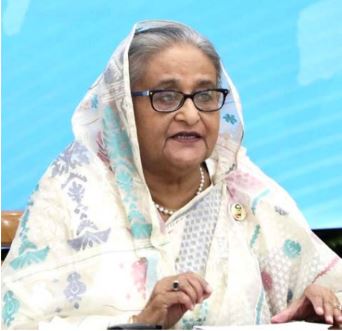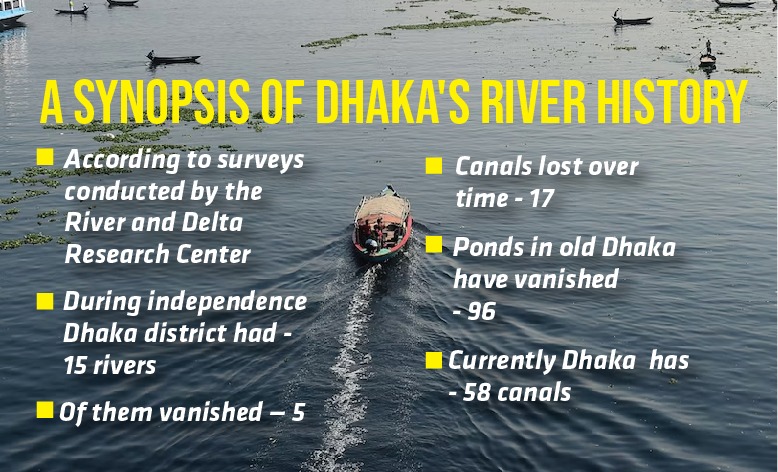On Monday (December 4, 2023), Prime Minister Sheikh Hasina directed authorities to expedite the restoration of canals in Dhaka and its surroundings, along with the Buriganga, Shitalakshya, Turag, and Balu rivers. At one time there were many rivers and canals in Dhaka, but with time, due to various reasons, they disappeared. The present government has taken various measures to restore them after coming to power.
PM’s Restoration Directive
Prime Minister Sheikh Hasina ordered this restoration of rivers and canals during a meeting at her Office, where a survey report and policy decisions related to a master plan aimed at preventing pollution and preserving river navigability were presented.

“We have to save our rivers if we want to save Bangladesh.”
– PM Sheikh Hasina
Seven hotspots were identified for restoration projects, including;
- Gazipur
- Garanchatbari
- Savar
- Purbachal
- Kalyanpur
- Narayanganj and
- Kamrangirchar
The Prime Minister emphasized integrated projects in these hotspots and recommended extending this strategy nationwide gradually. Principal Secretary M Tofazzel Hossain Miah presented the report, and Sheikh Hasina underscored the importance of stopping river pollution for the nation’s well-being, likening rivers to the veins of the country. She highlighted the government’s efforts to protect rivers, address encroachment, and restore navigability, mentioning challenges posed by unplanned lower-height bridges hindering water vessel movement during river dredging.
A Synopsis of Dhaka’s River History
Dhaka, a 400-year-old ancient city surrounded by numerous rivers and canals, is facing the disappearance of these water bodies due to encroachment and pollution. According to surveys conducted by the River and Delta Research Center, Dhaka district had 15 rivers during independence, but five of them—Anti, Kanai, Dolai, Pando, and Narai—have vanished. Additionally, 17 canals connecting the Buriganga, Turag, Balu, and Tongi rivers have been lost over time, with the current count of canals reduced from 75 to a mere few.

Over the past few decades, encroachment, pollution, and urban development have led to the filling of rivers, the construction of buildings along their banks, and the disappearance of canals. The Narai River, which once flowed from Buriganga-Turag to Balu, has been altered, with its western arms forming part of today’s Dhanmondi Lake. Other lost rivers, such as Sonabhan, have contributed to the diminishing water bodies in the metropolitan area.
The River and Delta Research Center identified the historical locations of these lost rivers, including the Pando River from Dhanmondi to Mohammadpur, Narai River from Balu River to KarwanbazarJame Masjid, Anti River from Bichla Bridge to Antibazar, Kanai River from Tongi to Uttara and Abdullahpur, and Dolai River from Termukh to Dholaikhal in old Dhaka.
Current experts estimate that around ten rivers are still present around Dhaka, but they are under threat due to encroachment and pollution. Many rivers become unnavigable during the dry season, with squatters building structures by filling the riverbeds with soil. Pollution from chemical waste and sewage further narrows the river channels, impacting the natural course of the rivers.

The occupation of rivers and canals has significant implications for the lifestyle in the capital, causing waterlogging, minor floods in low-lying areas, and the disappearance of numerous ponds. Over the years, 96 ponds in old Dhaka have vanished, according to a survey by the River and Delta Research Center using a topography map from 1924.
The district administration reports that Dhaka currently has 58 canals, but the Bangladesh Center for Environment and Geographical Information Services (CEGIS) suggests that only 26 are still operational. There is a proposal to connect these 26 canals with the four main rivers of Dhaka, but it requires prompt clearing of the canals.
The construction of a 34 km city protection dam in the 1990s has led to the separation of inner canals from the rivers. The dam, designed to prevent floodwater from entering the city, includes ineffective regulators that obstruct the flow of canal water into the rivers. Among the 26 canals disconnected from the rivers due to illegal encroachment, several are located in the western and eastern parts of the city, including Katasur, Hazaribagh, Ibrahimpur, Kalyanpur, Abdullahpur, Jirani, Manda, Meradia-Gazaria, and others. Clearing these canals is essential to restore the natural water flow around Dhaka and address the environmental challenges posed by the disappearing water bodies.
River Restoration Initiatives
The government in Bangladesh has undertaken commendable initiatives for the restoration of rivers and canals, recognizing the critical importance of these water bodies for the country’s environmental sustainability and economic development.
The government enacted the National River Protection Commission Act in 2013 to safeguard rivers, leading to the establishment of the National River Protection Commission on August 5, 2014. The commission’s duties, outlined in section 12 of the act, encompass preventing illegal occupation of rivers, removing unauthorized structures on riverbanks, combating pollution, addressing irregularities, restoring normal river flow, and promoting navigability for socio-economic development. The ‘Delphi Plan-2100’ is proposed as a comprehensive strategy for flood, river erosion, water supply, waste management, and flood control.
With a visionary approach, the government has implemented a series of measures aimed at mitigating the adverse effects of pollution, encroachment, and mismanagement of water resources.
Comprehensive River Management Plan:
Sheikh Hasina’s government has implemented a holistic approach towards river and canal restoration through the introduction of a Comprehensive River Management Plan. This plan aims to address various issues such as pollution, encroachment, and erosion while ensuring sustainable use of water resources.
Strict Anti-Pollution Measures:
To combat water pollution, the government has taken stringent measures. Effluent treatment plants have been installed to treat industrial waste before it is discharged into rivers and canals. Additionally, public awareness campaigns have been launched to educate citizens about the detrimental effects of dumping waste into water bodies.
Afforestation Along Riverbanks:
Recognizing the importance of vegetation in maintaining river ecosystems, the government has initiated afforestation projects along riverbanks. Tree plantation not only helps prevent erosion but also improves water quality by acting as a natural filter, reducing sedimentation and absorbing pollutants.
Community Involvement and Awareness:
The government has actively engaged local communities in river restoration efforts. By fostering awareness and involving citizens in cleanup drives, the administration encourages a sense of ownership and responsibility among the people towards their water resources.
Regulation of Riverbank Development:
To prevent illegal encroachment and haphazard development along riverbanks, the government has introduced regulations and guidelines. This ensures that construction activities are carried out responsibly, preserving the natural flow of rivers and preventing further degradation of water bodies.
Dredging Operations for Navigation:
Dredging plays a crucial role in maintaining the navigability of rivers and canals. Sheikh Hasina’s government has invested in dredging operations to remove silt and sediment, improving water flow and preventing the build-up of debris that can lead to flooding.
International Collaboration:
Recognizing the transboundary nature of rivers, the government has engaged in diplomatic efforts for regional collaboration. By fostering partnerships with neighboring countries, Bangladesh aims to address shared challenges and work towards sustainable river management on a broader scale.


